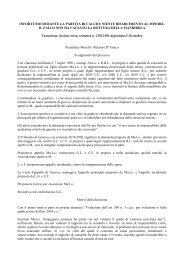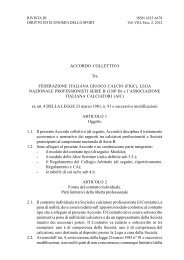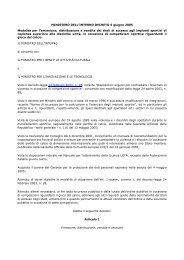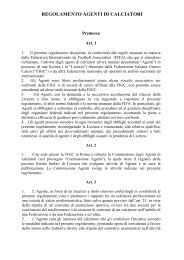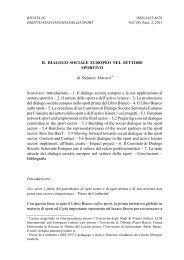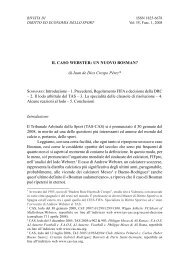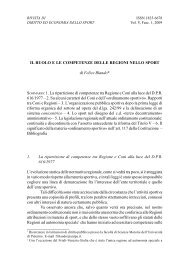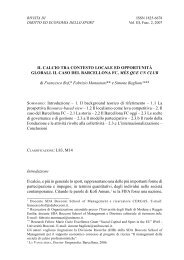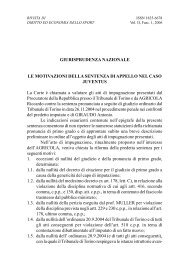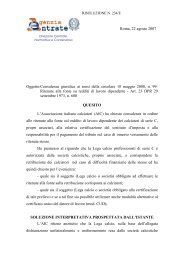Create successful ePaper yourself
Turn your PDF publications into a flip-book with our unique Google optimized e-Paper software.
Globalization of the sports economy 25<br />
and least developed countries. Since then very few researches have emerged in this<br />
area of uneven sport globalization, in particular to test a significant relationship<br />
between a low level of sport and economic development on the one hand and, on<br />
the other hand, the qual<strong>it</strong>y of sport performances at global level.<br />
In post-communist trans<strong>it</strong>ion countries, the major issue is not international<br />
sport performance. When these countries were ruled by a communist regime, they<br />
were gaining a number of Olympic medals qu<strong>it</strong>e higher than the one predicted from<br />
their GDP per cap<strong>it</strong>a and population (they were outliers in all econometric<br />
regressions). Such specific<strong>it</strong>y was explained by their capac<strong>it</strong>y to mobilize (sometimes<br />
in a nearly mil<strong>it</strong>ary way) very significant human and financial resources in favour<br />
of preparing and training athletes in the framework of a state centralized sport<br />
organization, leaving no room to market mechanisms. 27<br />
Trans<strong>it</strong>ion to a market economy, coupled w<strong>it</strong>h an economic crisis in <strong>it</strong>s<br />
early years, led to a lower international sport performance in the whole former<br />
Soviet area. However, such a decrease did not affect the relative weight of those<br />
countries w<strong>it</strong>h respect to the rest of the world. In fact, the hypothesis of a (formal<br />
and informal) inst<strong>it</strong>utional inertia in the functioning of East-European sports<br />
systems, while economic inst<strong>it</strong>utions were transformed in depth into a market<br />
economy, has been empirically confirmed. 28 The accession of ten Central Eastern<br />
European countries to the European Union in 2004 and 2007 has increasingly<br />
brought into line their sport organization and financing systems w<strong>it</strong>h those of Western<br />
Europe. 29 Economic globalization of sport probably would not have grown so fast<br />
w<strong>it</strong>hout the relaxed att<strong>it</strong>ude of sports governing bodies towards the big influx of<br />
money into sport at global level. The IOC´s U-turn in the 1980s is to be stressed<br />
here. As from 1981, the IOC no longer required an athlete participating in the<br />
Olympic Games to have an amateur status. It thereafter legalised the explo<strong>it</strong>ation<br />
of <strong>it</strong>s brand (i.e. Olympic symbols) in commercial business in 1986.<br />
International sport federations have adopted money-attracting strategies<br />
geared towards sponsors and the media in order to increase the number of their<br />
affiliated national federations and their individual members, so that their international<br />
championships or cups and the latter’s audience become really global. In 2001, the<br />
volleyball international federation accounted for 218 affiliated national federations,<br />
____________________<br />
27<br />
S. POUPAUX, Soviet and post-soviet sport, W. Andreff, S. Szymanski, (eds.) 316-24, S. POUPAUX,<br />
Performances économiques et transformations du secteur sportif dans les pays est-européens.<br />
Une contribution à l’économie du sport, Ph. D dissertation, Univers<strong>it</strong>y Paris 1, December 2006.<br />
28<br />
W. ANDREFF, S. POUPAUX, The inst<strong>it</strong>utional dimension of the sports economy in trans<strong>it</strong>ion<br />
countries, in M.M. Parent, T. Slack, (eds.), International Perspectives on the Management of<br />
Sport, Elsevier, Amsterdam, 2007, 99-124.<br />
29<br />
This is one conclusion of a (not yet published) report on public and private financing of sport<br />
in the 27 EU member countries. The report was sponsored by the French Ministry for Sports and<br />
will be published by the end of <strong>2008</strong>, AMNYOS CONSULTING, W. ANDREFF, Public and Private<br />
Financing of Sport in Europe, preliminary report to be subm<strong>it</strong>ted to the meeting of EU sports<br />
ministers, Biarr<strong>it</strong>z, 27 November, <strong>2008</strong>.




